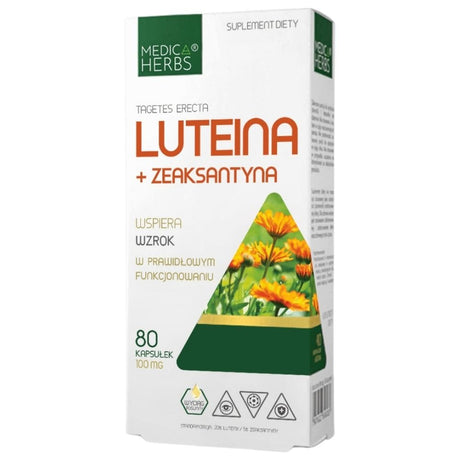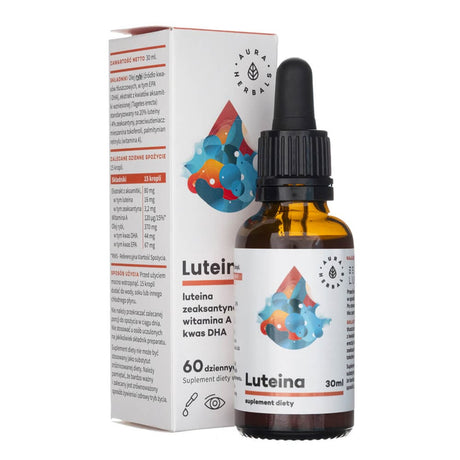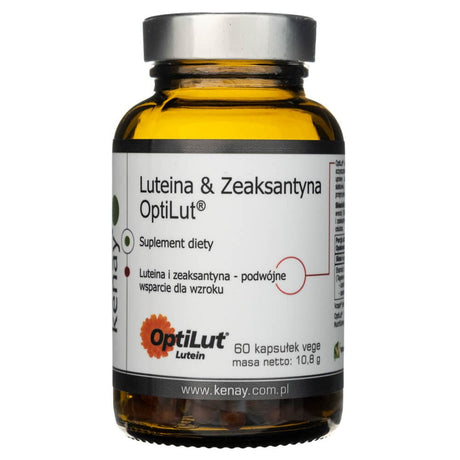Medica Herbs
Medica Herbs Lutein + Zeaxanthin - 80 Kapseln
Normaler Preis €6.69Grundpreis€0.08 pro StückNow Foods
Now Foods Lutein & Zeaxanthin - 60 Weichkapseln
Normaler Preis €19.39Grundpreis€0.32 pro StückPurelab Marek Skoczylas
Skoczylas für die Augen - 60 Kapseln
Normaler Preis €9.59Grundpreis€0.16 pro StückActivlab
Activlab Pharma Lutein Extra 40 mg - 30 Kapseln
Normaler Preis €5.09Grundpreis€0.17 pro StückAura Herbals
Aura Herbals Lutein Zeaxanthin Vitamin A DHA & EPA Säuren, Tropfen - 30 ml
Normaler Preis €10.89Grundpreis€3.63 /10mlKenay
Kenay Lutein & Zeaxanthin OptiLut 600 mg - 60 Kapseln
Normaler Preis €15.49Grundpreis€0.26 pro StückSolgar
Solgar Heidelbeer-Ginkgo-Augentrost-Komplex plus Lutein - 60 pflanzliche Kapseln
Normaler Preis €21.79Grundpreis€0.36 pro StückAliness
Medicaline Lutein Medica Complex 25 mg - 30 Kapseln
Normaler Preis €4.29Grundpreis€0.14 pro StückDoctor's Best
Doctor's Best Lutein von OptiLut - 120 pflanzliche Kapseln
Verkaufspreis €17.99 Normaler Preis €19.99Grundpreis€0.15 pro StückAura Herbals
Aura Herbals Lutein + Zeaxanthin + Vitamin A - 60 Kapseln
Normaler Preis €9.49Grundpreis€0.16 pro Stück
Lutein & Zeaxanthin: Die essenziellen Carotinoide für die Augengesundheit und darüber hinaus
Lutein und Zeaxanthin sind zwei leistungsstarke Carotinoide, die eine entscheidende Rolle für unsere tägliche Sehfunktion und unsere allgemeine Gesundheit spielen. Diese Nährstoffe sind wichtig für die Versorgung der Photorezeptoren der Netzhaut, und ermöglichen es uns, klar zu sehen und unsere täglichen Aufgaben zu erfüllen. Aber was genau sind Lutein und Zeaxanthin, und warum sind sie so wichtig für unseren Körper? Erforschen wir diese bemerkenswerten Verbindungen und entdecken wir, wie sie zu unserem Wohlbefinden beitragen.
Lutein & Zeaxanthin verstehen: Die Augenschützer der Natur
Lutein und Zeaxanthin sind natürlich vorkommende Carotinoidverbindungen, die hauptsächlich in Pflanzen vorkommen. Diese Pigmente sind für die leuchtenden Farben in vielen Obst- und Gemüsesorten verantwortlich. Im menschlichen Körper, haben Lutein und Zeaxanthin eine besondere Affinität zu Augengeweben, insbesondere zur Netzhaut. Hier sehen Sie, wo sie in Ihrem Körper zu finden sind:
- Netzhaut: Sowohl Lutein als auch Zeaxanthin sind in der Netzhaut, konzentriert, aber sie sind nicht gleichmäßig verteilt.
- Makula: Zeaxanthin findet sich in höheren Konzentrationen im Zentrum der Makula (Fovea), dem Bereich, der für unser schärfstes Sehen verantwortlich ist.
- Periphere Netzhaut: Lutein ist in den peripheren Bereichen der Netzhaut häufiger zu finden.
- Haut: Lutein reichert sich auch in der menschlichen Haut an, und bietet Schutz vor UV-Strahlung.
Die wichtigste Eigenschaft von Lutein und Zeaxanthin ist ihre Fähigkeit, als starke Antioxidantien zu wirken, und schädliche freie Radikale im Körper zu neutralisieren. Diese antioxidative Wirkung trägt zum Schutz vor verschiedenen chronischen Krankheiten bei und unterstützt die allgemeine Gesundheit.
Vorteile von Lutein & Zeaxanthin: Mehr als nur Augengesundheit
Lutein und Zeaxanthin sind zwar in erster Linie für ihre Vorteile für die Augengesundheit bekannt, aber ihre positiven Auswirkungen erstrecken sich auch auf andere Bereiche der Gesundheit:
1. Augengesundheit
- Vorbeugung der Makuladegeneration: Eine Ernährung, die reich an Lutein und Zeaxanthin ist, kann das Risiko einer altersbedingten Makuladegeneration (AMD) verringern.
- Verringerung des Kataraktrisikos: Diese Carotinoide können dazu beitragen, das Risiko der Kataraktbildung zu verringern.
- UV-Schutz: Lutein und Zeaxanthin wirken wie eine innere Sonnenbrille, die die Augen vor schädlichen UV-Strahlen schützt.
- Sehschärfe: Sie unterstützen die Makula, die für das zentrale Sehen und die Sehschärfe verantwortlich ist.
2. Hautgesundheit
- UV-Schutz: Lutein reichert sich in der Haut an, und bildet eine natürliche Barriere gegen UV-Strahlung.
- Feuchtigkeitsspeicherung: Es kann helfen, den Feuchtigkeitsverlust der Haut zu verringern.
- Anti-Aging: Die antioxidativen Eigenschaften von Lutein können dazu beitragen, Anzeichen der Hautalterung zu bekämpfen.
3. kognitive Funktion
- Gesundheit des Gehirns: Jüngste Studien legen nahe, dass Lutein und Zeaxanthin die kognitive Funktion unterstützen können.
- Gedächtnis und Verarbeitung: Die Einnahme von Lutein und Zeaxanthin wurde mit einer Verbesserung des Gedächtnisses, des logischen Denkens, und der Aufmerksamkeitsspanne in Verbindung gebracht.
Für alle, die ihre Augengesundheit und ihr allgemeines Wohlbefinden, unterstützen möchten, bietet unsere Eye & Vision Health Kollektion eine Reihe von Nahrungsergänzungsmitteln mit Lutein und Zeaxanthin.
Nahrungsquellen für Lutein & Zeaxanthin
Da unser Körper Lutein und Zeaxanthin nicht selbst herstellen kann, müssen wir sie über die Nahrung oder durch Nahrungsergänzungsmittel aufnehmen. Hier sind einige der besten Nahrungsquellen:
- Grünes Blattgemüse: Grünkohl (39 mg/100g), Spinat (11.9 mg/100g), Kopfsalat
- Anderes Gemüse: Brokkoli, Zucchini, Kürbis, Rosenkohl, Grüne Erbsen, Mais, Grüne Bohnen, Karotten
- Früchte: Nektarinen, Brombeeren, Stachelbeeren, Avocados, Kiwis, Himbeeren, schwarze Johannisbeeren
- Eigelb: Besonders von Hühnern, die mit pflanzlichen Lebensmitteln gefüttert wurden
Es ist wichtig zu beachten, dass der Gehalt an Lutein und Zeaxanthin in Gemüse je nach Anbaubedingungen, Bodenqualität, und Zubereitungsmethoden variieren kann. Die meisten dieser Verbindungen sind in den Schalen von Obst und Gemüse enthalten.
Nahrungsergänzung mit Lutein und Zeaxanthin
Eine ausgewogene Ernährung mit viel Obst und Gemüse ist zwar ideal, aber viele Menschen profitieren von einer Nahrungsergänzung mit Lutein und Zeaxanthin, insbesondere,:
- Ältere Erwachsene, da der natürliche Spiegel mit dem Alter abnimmt
- Personen mit schlechter Ernährung oder eingeschränktem Verzehr von Obst und Gemüse
- Personen mit einer familiären Vorgeschichte von Augenkrankheiten
- Personen, die starkem blauen Licht von digitalen Geräten ausgesetzt sind
Bei der Auswahl eines Nahrungsergänzungsmittels, sollten Sie die folgenden Richtlinien beachten:
- Achten Sie auf ein Verhältnis von etwa 5:1 Lutein zu Zeaxanthin
- Entscheiden Sie sich für Nahrungsergänzungsmittel, die auch Omega-3-Fettsäuren für eine bessere Absorption
- Wählen Sie Produkte mit zusätzlichen nützlichen Inhaltsstoffen wie Heidelbeerextrakt, Vitamin A, C, E, Zink, Kupfer, und Selen
- Bevorzugen Sie kristallines Lutein gegenüber verestertem Lutein für eine bessere Absorption
Für eine Auswahl an hochwertigemhochwertigen Lutein- und Zeaxanthin-Nahrungsergänzungsmitteln, finden Sie in unserem Lutein & Zeaxanthin Kollektion .
Fazit: Die Kraft von Lutein & Zeaxanthin
Lutein und Zeaxanthin sind essentielle Nährstoffe, die eine wichtige Rolle bei der Aufrechterhaltung der Augengesundheit, beim Schutz unserer Haut, und möglicherweise bei der Unterstützung kognitiver Funktionen spielen. Diese Carotinoide sind zwar von Natur aus in vielen Obst- und Gemüsesorten enthalten, aber in der modernen Ernährung oft nicht in optimaler Menge.
Indem Sie lutein- und zeaxanthinreiche Lebensmittel in Ihre Ernährung aufnehmen und bei Bedarf eine Nahrungsergänzung in Betracht ziehen, können Sie proaktiv etwas für die Gesundheit Ihrer Augen tun, Ihre Haut vor UV-Schäden schützen und möglicherweise Ihre kognitiven Funktionen verbessern. Denken Sie daran, dass diese Nährstoffe am besten wirken, wenn sie mit einer gesunden Lebensweise kombiniert werden, einschließlich einer ausgewogenen Ernährung, die reich an pflanzlichen Lebensmitteln und gesunden Fetten ist, um ihre Aufnahme zu fördern.
Ob über die Ernährung oder durch Nahrungsergänzungsmittel, eine ausreichende Aufnahme von Lutein und Zeaxanthin ist eine Investition in Ihre langfristige Gesundheit und Ihr Wohlbefinden, die nicht nur Ihre Sehkraft, sondern Ihre gesamte Lebensqualität unterstützt.








































